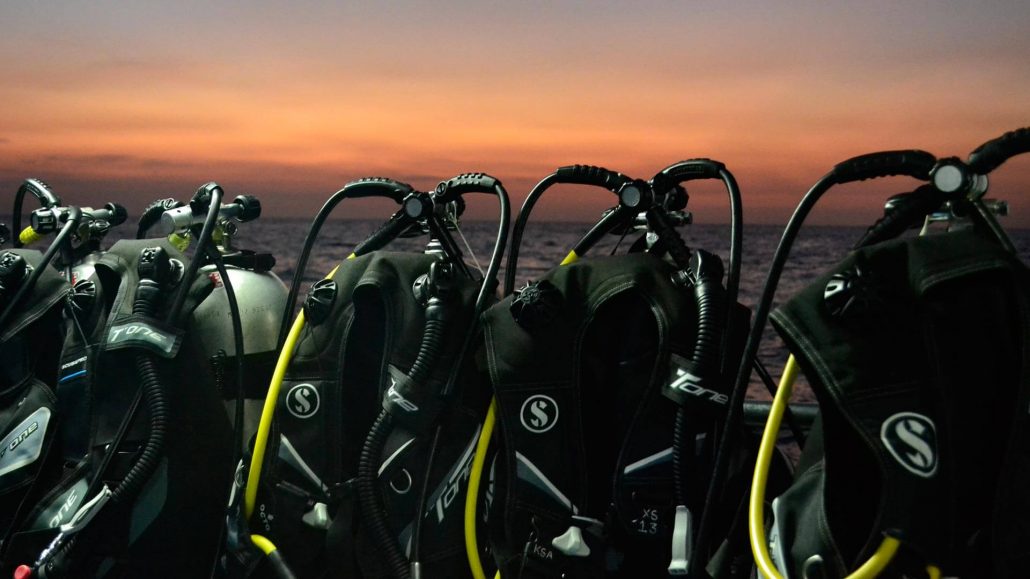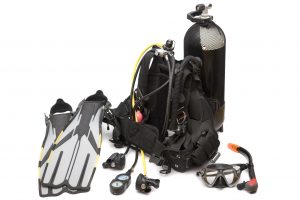The Main Scuba Diving Equipment. How to choose?

Scuba diving is a kind of sport that requires quite specific equipment that each diver must either have or rent in a dive center. In this article we list the essential material needed to practice this fascinating underwater activity. You wonder what you should buy first? Here is a list of scuba diving gear items that we recommend you to get first.
1. The mask and the snorkel
These two items are usually bought together. The mask is a paramount tool for diving since it enables us to see underwater (without the layer of air in front of our eyes, it is impossible to have a good vision in water). Moreover, it prevents water from penetrating in our eyes and our nose. There are various types of masks: black, transparent, coloured, out of silicone, with one or two lenses, with broad vision or narrower vision etc. It is necessary to try masks on to choose one that would fit the shape of our face (it must make suction effect, not too tight, have enough space for the nose…). An uncomfortable mask can disturb you a lot and ruin your dives, this is why having your own mask is very important. You feel self-confident and comfortable while diving if you use a mask of a proper size and if you are accustomed to it. An advantage is that you can do some snorkeling on the surface when you are not scuba diving. For that you obviously need a snorkel too (also in scuba diving, for the surface swimming), it is often sold along with the mask. Nowadays snorkels are very practical, they have valves which make it possible to eliminate water more easily. There are all sizes and colours. This equipment does not occupy much space in the luggage, it is therefore easy to transport it with you on holiday. The prices vary according to the quality, in general you can get very good kits masks+snorkels for less than 70€. That makes it the first purchase which we would recommend any diver to do.
2. Dive computers
This is a tool that calculates and saves the data of your dives. It shows you the depth, bottom time, maximum duration which your dive can last to avoid decompression illness (by taking into consideration your previous dives of the day too). It also keeps in memory your old dives and thus allows you to keep a history of your activity. Considering its importance, it is recommended to any diver to have his/her personal computer from the very beginning. There are various types such as the computer-watches; those which use Nitrox or gas blends; others with a wireless air integrated connection to the bottle to calculate the air consumption etc. Thus this gear item is one of the most essential to divers and fortunately costs now much cheaper then used to even 5 years ago (starting from 140€).
3. Fins and neoprene boots
To have your own boots and fins is the next step to equip you. The fins exist in a multiplicity of models, materials, forms, weight, etc. There are full foot fins and others which are open heel, worn always with boots that provides hygiene and comfort. Choosing the fins take into consideration that the larger they are, the more strength you need to move but also the quicker you swim. It is possible to find various prices for fins. The average price for good ones would be 60-80€.

4. Exposure suit
It is recommended to buy your own suit, which makes diving more pleasant and comfortable. It is also an undeniable advantage for hygiene. What suit to choose? It depends on the place and the kind of diving you are planning to do. In cold water (below 17 degrees) divers use a dry suit (which does not let the water come inside), dives in warmer water are made with neoprene semi-dry or wetsuits (they let enter a little water which is heated in contact with our body and then the suit keeps it inside without letting it go during the dive). Wet suits can have various thickness, be long or short. You choose according to the temperature of water. The prices of exposure suits depend on its kind, the dry ones being more expensive than the wet ones.
5. The regulator
It enables us to breathe underwater, it is thus the most important piece of equipment. Most divers rent it in the dive shops because it is an expensive item of equipment. Nevertheless, the fact of having his/her own one makes diving safer since we are in charge of its correct use, storage and periodical service. It is recommended to buy a regulator set of good quality and easy-to-maintain. It generally consists of a first stage (which reduces the high pressure of the cylinder), a second stage (which reduces the intermediate pressure into ambient pressure and allows us to breathe), an alternate air source, a pressure gauge (which shows the pressure in the bottle) and a connection to the BCD. It is possible to find good models starting from 300 €, but the prices can reach 1000€ and more.
6. The BCD (Buoyancy Control Device)
Like the regulator, this part of the equipment is more often rented in the dive centers. Its size makes it more difficult to transport, although there exist some «travel» models, which take up less space and weigh less. The BCD makes it possible to manage our buoyancy in the water and to keep our equipment in place. It is a very important material. Having our own BCD we make our dives easier since we know exactly where the clips and the pockets are, etc. It is also adapted to our body and it is easier to control our buoyancy with a BCD which we are used to. There are various kinds of them: with or without integrated weights, classic or wings, etc. We advise to choose a comfortable, solid, practical BCD (with pockets and D-rings to fasten the equipment and accessories), with several dump valves…
Of course, a diver’s equipment consists of more items, we can add many of them: torches, whistles, buoy, compass and many others. They are also very important. What we want to buy depends on our level, number of dives we do per year, kind of scuba diving, etc. This list can be modified according to the interests of each person. To our mind these 6 items are the basic equipment that any certified diver should have.

Read also:
6 Water Sports To Do In Tenerife
Six Reasons Why To Become A Certified Padi Open Water Diver